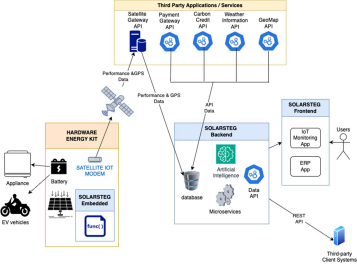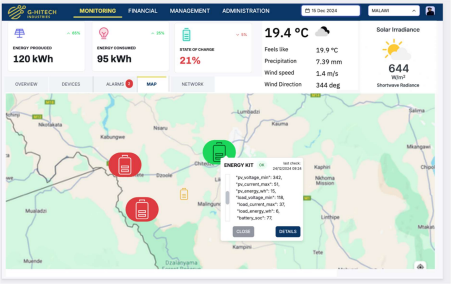Objectives of the service
Across Sub-Saharan Africa, millions of small businesses and cooperatives rely on expensive, polluting diesel generators due to unreliable or absent grid access. While solar energy is a cleaner and more affordable alternative in the long run, high upfront costs and lack of financing remain major barriers to adoption.
SOLARSTEG tackles this challenge by supporting the operationalization of new business models that make clean energy both accessible and manageable:
-
PayGo (Pay-As-You-Go): Many micro and small enterprises cannot afford the full cost of solar equipment upfront. PayGo allows them to lease energy kits through small, regular payments that are even lower than what they already spend on fuel.
-
Energy-as-a-Service (EaaS): For communities or cooperatives, shared infrastructure is often the most practical approach. Under EaaS, users do not need to own or maintain equipment.
They pay only for access to electricity-powered services such as charging, cooling, or e mobility, while G-HiTech or a local operator manages the infrastructure and operations. This ensures reliable service at a lower cost without financial or technical burden on the end-user.
These models are made viable by the SOLARSTEG platform, which uses satellite connectivity and GNSS to enable remote monitoring, billing, payment management, asset tracking, production forecasting and predictive maintenance, especially in regions with limited or no mobile network coverage. It also enables the generation of new revenue streams by capturing and monetizing clean energy data—through mechanisms such as carbon credits and Distributed Renewable Energy Certificates (D-RECs).
By combining solar-powered hardware with smart software and service-driven business models, SOLARSTEG makes clean energy scalable, affordable, and practical for underserved regions.
Users and their needs
SOLARSTEG-business models target businesses and community-based organisations in Sub-Saharan Africa that rely on diesel due to poor grid access. These users face high energy costs, unreliable power, and limited financing options.
The main user groups are:
-
User Group A – MSMEs (Micro, Small and Medium Enterprises):
-
Need stable electricity to operate efficiently
-
Struggle with the high and unpredictable costs of operating diesel generators, due to fuel shortages, price instability, and frequent maintenance
-
Lack access to affordable financing for solar solutions
-
-
User Group B – Energy Hub Managers (cooperatives/franchisees):
-
Require tools to manage shared solar hubs effectively
-
Need integrated features for billing, payments, alerts, usage monitoring, consumption planning and remote control
-
Seek service continuity and revenue tracking without cash handling
-
-
User Group C – End-users of energy hubs (cooperative members):
-
Includes a wide range of rural, electricity-powered activities such as battery charging, produce cooling, e-mobility, clean water access, or irrigation.
-
Need affordable and accessible energy services
-
Struggle with frequent power outages, unreliable diesel supplies and rising fuel costs, all of which limit productivity and reduce revenue.
-
Want predictable costs and more reliable equipment to sustain their activities
-
(Pilot) Target countries: Burundi, Malawi, Cameroon
Service/ system concept
SOLARSTEG is a digital platform designed to support decentralized solar energy services, combining IoT-based system monitoring, automated billing and payment management and remote asset management into one integrated solution.

The platform provides the following core functionalities:
-
Continuous system monitoring of solar energy production, consumption and battery status
-
Production forecasting and predictive maintenance based on performance data and environmental conditions
-
Configurable billing engine for prepaid and usage-based pricing, with automated alerts and payment tracking
-
Remote power control and alerting to ensure service continuity and manage non-payment
-
Asset tracking via GNSS for security, deployment monitoring, and carbon credit verification
-
Integration with satellite IoT for reliable data transmission in areas with limited or no mobile
network coverage
The system is structured around a modular architecture:
-
A local embedded module installed in each energy kit or hub collects data and communicate via satellite
-
A cloud-based backend processes data, integrates third-party services (e.g. mobile money weather APIs)
-
A user-friendly interface (web and mobile) provides dashboards for end-users, operators, and technicians
This architecture enables scalable deployment across low-connectivity environments and supports end-users in accessing clean energy efficiently and transparently.
Space Added Value
SOLARSTEG integrates space-based assets to overcome the key infrastructure and communication challenges in delivering decentralized solar energy in Sub-Saharan Africa.
The following space assets are leveraged:
-
Satellite IoT communication ensures data transmission between remote energy systems and the central platform, even in areas with poor or no mobile network coverage. This enables continuous monitoring, billing, and remote management without depending on unreliable terrestrial networks.
-
GNSS provides accurate location data for all deployed energy kits and hubs. This supports asset tracking, geo-fencing, technician dispatching, and verification for carbon credit certification.
The combination of these space assets provides unique advantages over traditional approaches:
-
Ensures operational continuity in off-grid and low-connectivity regions
-
Enables scalable deployment across fragmented rural geographies
-
Strengthens system security and transparency through GPS-based verification
-
Unlocks new revenue streams via carbon and D-REC credits supported by geolocation data
-
Supports predictive maintenance and service optimization through integration with environmental data sources (e.g. solar irradiance, temperature)
These capabilities are essential to enable G-HiTech’s business models—particularly PayGo and Energy-as-a-Service—in the most underserved and remote markets.
Current Status
The KickStart activity confirmed the technical feasibility and strong market relevance of the SOLARSTEG platform. Key outcomes include:
-
Extensive field engagement in Burundi, Malawi, and Cameroon, involving over 50 MSMEs, cooperatives, and energy stakeholders.
-
Validation of user needs and business models (PayGo and EaaS) through workshops, interviews, and site visits.
-
Definition of technical architecture and design of UI mockups for core functionalities, including monitoring, payment management, and asset tracking.
-
Successful testing of satellite IoT communication using an ORBCOMM modem during a pilot in Malawi.
-
Integration specification completed for local payment gateways and weather APIs, integration with carbon credit registries is ongoing.
-
Deployment of a first energy hub pilot underway in Burundi providing a testbed for the EaaS model.
-
Preparations in progress for a second pilot to validate the Energy Kit for businesses with the PayGo model

The SOLARSTEG software platform is now ready to enter the development phase. A demonstration project is being prepared to build the minimum viable product and validate operations in real-world conditions.


